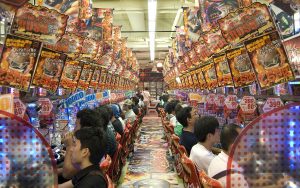
The upper house of Japan’s National Diet began Friday discussions on the Integrated Resort Implementation Bill that, if approved, will authorize the construction of up to three casino resorts across the nation.
The consideration and the anticipated approval of the piece represent the second of a two-stage process for the legalization of casino gambling within integrated resorts in Japan. The bill was approved by the House of Representatives last month and now needs a final vote by Councilors. The Diet even extended this year’s legislative session to July 22 so that lawmakers have enough time to review the piece of legislation and vote it through. The Japanese legislature’s regular session ended on June 20.
During Friday’s upper house meeting, Tourism Minister Keiichi Ishii first presented the bill to his fellow lawmakers. A Q&A session then took place so that additional details about the piece be provided.
Responding to a question about the benefits from the construction of casino resorts in the country, Prime Minister Shinzo Abe said that the properties would create jobs, bring international tourists to boost tourism, and encourage regional development.
The country’s top lawmaker further pointed out that too much attention has been paid on the fact that the integrated resorts would feature a gaming floor and less so on the multiple other amenities these would include. Under the bill, casinos would occupy no more than 3% of the whole resorts’ area.
Prime Minister Abe further stressed that integrated resorts would help to turn Japan into a tourism-oriented country. While lawmakers are still to pass the key legislative piece, international companies, some of which are known to be giants in the gaming and hospitality industries, are stepping up their efforts to win one of the three casino licenses that would be granted, committing to massive projects worth billions of dollars.
Melco Resorts & Entertainment, Las Vegas Sands, Genting Group, and MGM Resorts International have been few of the companies that have expressed interest into expanding to Japan’s nascent casino market when it finally opens.
Responsible Gambling Discussions

It was approved unanimously in the House of Councilors during a Friday vote. It is believed that the bill only sets out basic principles to be followed and that more legislative pieces on the responsible gambling topic will be rolled out.
Problem gambling has been discussed widely by lawmakers and members of the public, as Japan is already struggling with the issue. Official statistics show that around 3.2 million people have been addicted to one form of gambling or another at some point in their lives. It is also believed that around 700,000 have been addicted to gambling in the past year. Most of the cases of people being addicted to gambling involve pachinko, widely popular pinball-like gambling machines that can be found in tens of thousands of special parlors across the country.
To make sure that the introduction of casino gambling would not have a massive negative effect on the health of Japanese people, the government has introduced measures to limit the number of casino visits nationals would be allowed to three per week and ten per month; residents of the country will also have to pay an entry fee in order to be admitted to the gaming floor. These rules will not apply to international visitors.
The Integrated Resort Implementation Bill has already gained support by the ruling Liberal Democratic Party and its coalition partner in the Diet. This could have meant that the piece has secured a smooth passage through the House of Councilors, if it had not been for the opposition that had promised to fight the piece. Lawmakers now have two weeks to vote through the bill so that it is enacted and preparations for the licensing process and the eventual construction of the resorts begin.



























